There's no denying that the infiltration of AI into our lives is a controversial topic right now. While some believe it to be the future and are embracing it with arms wide open, others are wary of it. If you're on the former team though, browsers are one place where AI could make your lives easier.
Browsers are our gateways to most of the Internet these days, and also where we spend a heavy portion of our screen time, whether it's for leisure, work, or education. With AI features in your arsenal, you can be more productive in your web interactions. But which browsers are actually worth your time? We've compiled a list down below.
Arc Browser
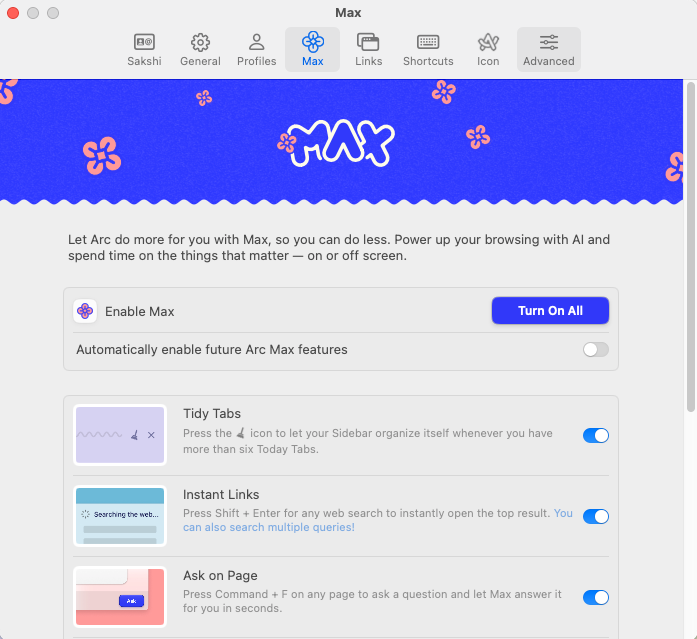
Arc Max in Arc
Pros: Access to models from both OpenAI and Anthropic; novel implementation of AI with features like link previews; instant links, etc.; Arc Search on iOS comes with its own set of AI features
Cons: Currently not available in the Windows version of the Arc Browser (might be coming soon, though); the mobile browser is not available on Android
Platforms: macOS, iOS
Josh Miller, CEO of The Browsing Company – the company behind Arc browser – may have been skeptical about AI at first, but Arc has been one of the first browsers with artificial intelligence features. And unlike most other browsers that have a rather similar implementation of AI in the browser, Arc does things differently, which is on-brand for the browser. (At this point, not doing things differently would be a diversion.) In fact, Arc seems to be going in a direction where it wants to become a true AI browser.
Arc has a lot of AI features under Arc Max that can help boost productivity while going about your daily browsing. With Arc Max, you get AI features like 5-second previews for links, Ask on Page, Tidy Tabs, Tidy Downloads, Tidy Tab Titles, Ask ChatGPT, and Instant Links.
5-second previews and Ask on Page are some of my favorite AI features in the Arc browser that I regularly use. With 5-second previews, you can hover over any website link and get an AI-generated summary of the webpage. This comes in especially handy on search engines like Google, Bing, etc. when you're searching for something and trying to decide which link to open further.
Ask on Page is rather self-explanatory. It lets you ask the AI any questions about the webpage you're currently browsing (you can ask for summaries, clarifications, etc.). Other AI features are also great at boosting your productivity and keeping you efficient.
There's also another browser for iOS (and iPadOS) – Arc Search – which has none of the AI features from the desktop version (which can be confusing for some) but it comes with its own AI superpowers that make it great. Its Browse for Me feature was a giant leap in how a browser could do the browsing for you. (If only Arc brings Browse for Me over to its desktop browser from its iOS browser!)
It also has a 'Pinch to Summarize' feature where you can pinch any webpage to get an instant summary. Recently, the team added another way to interact with AI in the browser, Call Arc Search, which brings conversational interactions to Arc Search. Currently, all the AI features in both browsers are free to use with no cap on usage.
Microsoft Edge
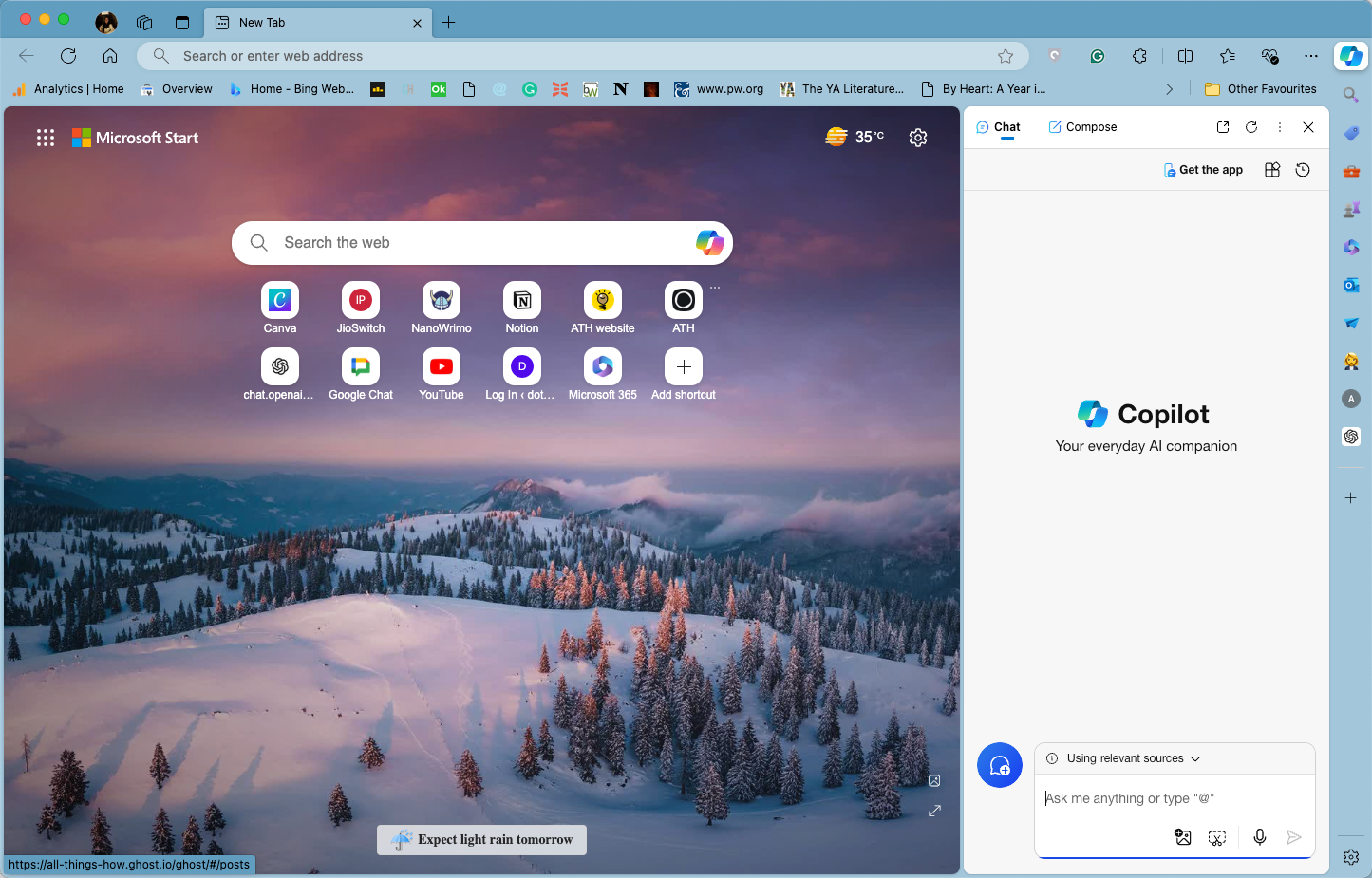
Copilot in Microsoft Edge
Pros: Access on all platforms; provides access to latest models from OpenAI; innovative features like video highlights; can perform actions on your behalf
Cons: Copilot's performance isn't consistent
Platforms: Windows, macOS, iOS, Android
Microsoft has been at the front and center of the companies hurrying to embrace AI as the future. While now the company has integrated AI in a lot of different products including their OS, Edge browser was one of their first products to get an AI makeover. It was also one of the first browsers at all to integrate AI.
Microsoft Copilot is an ever-present companion in the Edge browser. Accessible via the sidebar, it can help you summarize web pages or answer any questions about the content on the page. You can also use the Compose tool to write using Copilot.
Additionally, Copilot is accessible at various steps during browsing. You can send any links to Copilot to ask it about them and even ask it for video highlights, summaries, or any other questions while watching YouTube videos. With contextual awareness about the content on the page, it can be an extremely helpful assistant. It can also help you rewrite content as you're writing in any editor in Edge simply by selecting the text.
It can also perform certain tasks in the browser for you, like changing the appearance of your browser, opening your browser history, turning on vertical tabs, etc. like an assistant. There's potential for what Copilot could become in the future if Microsoft decides to further develop these features.
Other than Copilot, Edge also has other AI features, like AI tab grouping for tab organization, read-aloud to read any article or web content, AI theme generator, etc. Copilot is also free to use, although the latest model is only available with a Copilot Pro subscription.
Opera
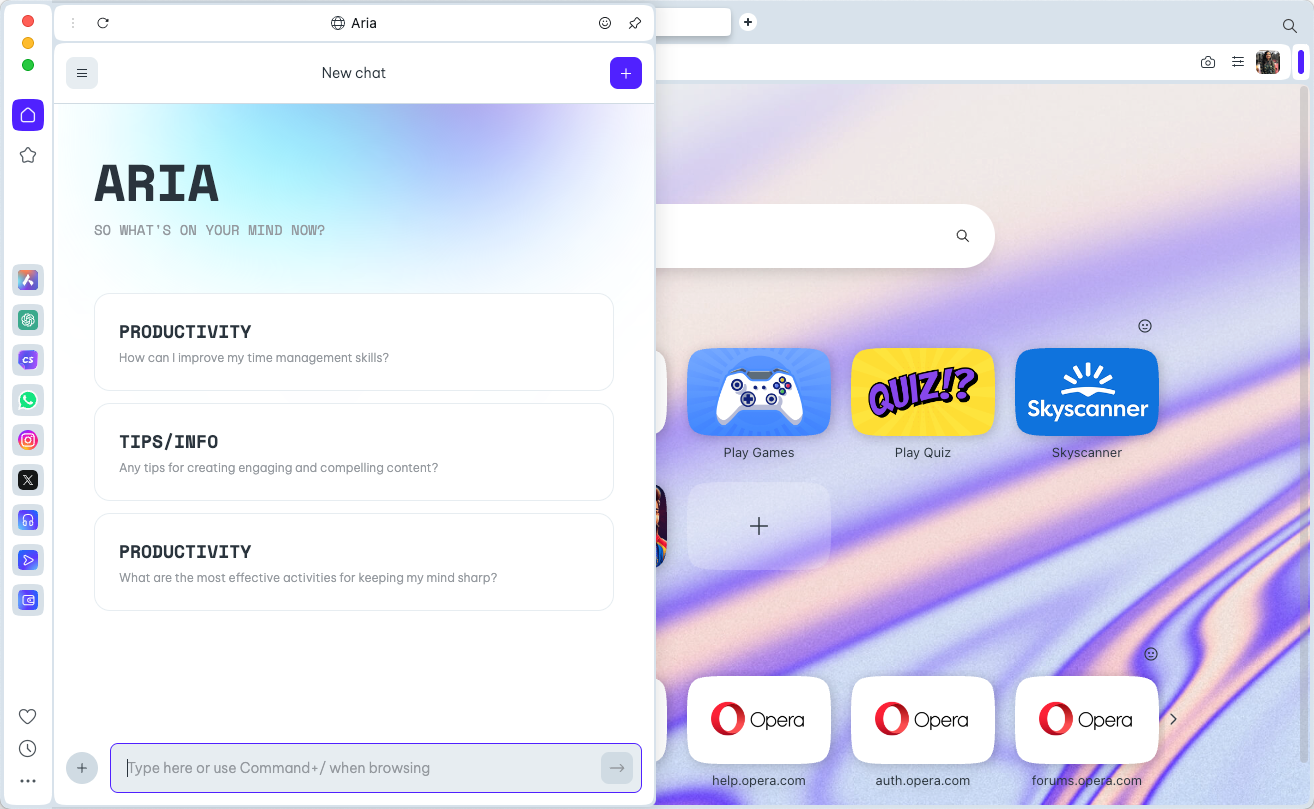
Aria in Opera
Pros: Access to models from both OpenAI and Google in one assistant; greater privacy with contextual awareness off by default
Cons: AI features are limited to interaction with the assistant in the sidebar
Platforms: macOS, Windows, iOS, Android
Opera is one of the oldest browsers in existence but it's far from old school. Other than the many features the browser touts, it has an in-built AI assistant to enhance your browsing experience.
Aria, their in-built AI assistant powered by LLM models from OpenAI and Google, is similar to the Copilot experience in Microsoft Edge. You can access Aria in Opera from the sidebar. It can answer questions, provide summaries, or find information from the Internet. You can also highlight any text from the Internet and use AI actions to find out more about it or translate it.
Similar to Copilot, it also has a Compose mode which you can leverage to write emails, tweets, or just about anything else. However, you can even train Aria to write in your style in the Compose mode which makes its Compose mode a notch better.
Apart from accessing Aria from the sidebar, you can also use Aria in a Command Line interface (Cmd/Ctrl + /) which makes it less invasive and distracting to use.
Aria can also have contextual awareness about the current page you're viewing. But Opera gives you more control over this feature so you can choose when Aria should have access to the information on the page and when not. This gives it an edge over well, Edge, in terms of privacy and security since you don't have to worry about any sensitive information, such as your banking information, being processed by the AI with constant contextual access.
It also gives quick access to other AI tools, like ChatGPT, and ChatSonic, in the sidebar.
However, an in-built AI assistant at your fingertips is just about the scope of Opera's AI features. There are no other AI features for tab organization etc. at the moment.
Opera Developer
If you want a browser that can run local LLM models, then you can install the Opera Developer browser from Opera. With experimental support for over 150 LLMs from around 50 different families of models in addition to their AI assistant Aria, Opera Developer is the only web browser that allows you to run local AI on your machine.
With local AI models, you don't have to worry about your data being transmitted to the AI's servers. However, there are tradeoffs involved, like storage space and speed. You can find more about it in our dedicated post below.

SigmaOS
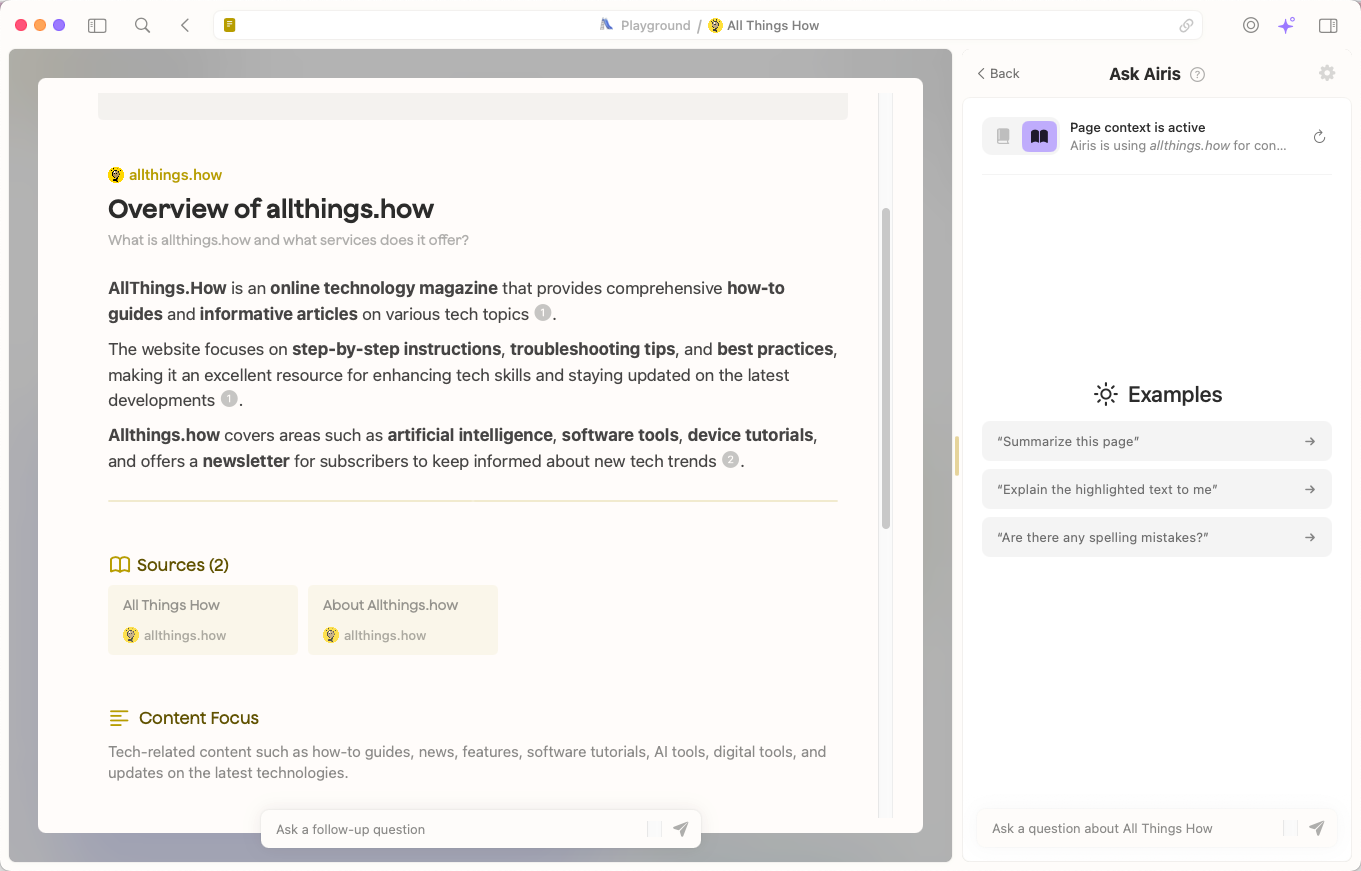
Airis in SigmaOS
Pros: Access to features like Look It Up and Summarize, which no other browser AI currently gives
Cons: Limited features with the free plan; only available on macOS
Platforms: macOS
SigmaOS, another off-beat browser with a drastically different UI, is also one of the best browsers to offer AI features. While the browser reminds me of Arc (and there are too many similarities but also many differences), their AI implementation is not the same.
Airis, SigmaOS's native AI assistant, mostly follows the traditional path when it comes to AI implementation. What's the traditional path? You know – the one where the AI is accessible in the browser sidebar and you can chat with it anytime.
It has contextual awareness, so you can ask questions about the content on the page. It can provide summaries, explain highlighted content, or answer any questions in general.
Much like Opera, it also offers the option to turn contextual awareness on/ off. However, unlike Opera, contextual awareness is not off by default, which makes Opera's implementation more thoughtful and privacy-centric. Still, you can turn it off with a simple toggle, which is great.
It also has other AI features: Look it Up and Simplify (which are similar to Arc's Browse for Me and Pinch to Summarize from iOS) but SigmaOS brings it to the desktop.
With Look It Up, Airis can find and compile information for you on any topic which you can use as a starting point. It includes information from you from across the web with resources for further exploration.
Simplify provides an AI-generated summary of the webpage with a pinch or a simple shortcut.
You can also ask follow-up questions about the generated content in both features. SigmaOS has also implemented another AI feature that lets you hover over a link to get previews.
However, there's one caveat. Airis uses ChatGPT-3.5 for free users and you only get a limited number of queries for Look It Up and Summaries. SigmaOS offers paid plans for upgrades, though: Personal Pro (20$/month) gives access to Airis with GPT-4o and higher usages for other features, and Personal Max (30$/month) gives access to other models, like Llama, Claude, and unlimited queries.
If you want, you can use my referral link to sign up for SigmaOS which will give you $5 credits which you can use towards buying the paid plan. Then, you can further refer people to get more credits.
Brave Browser
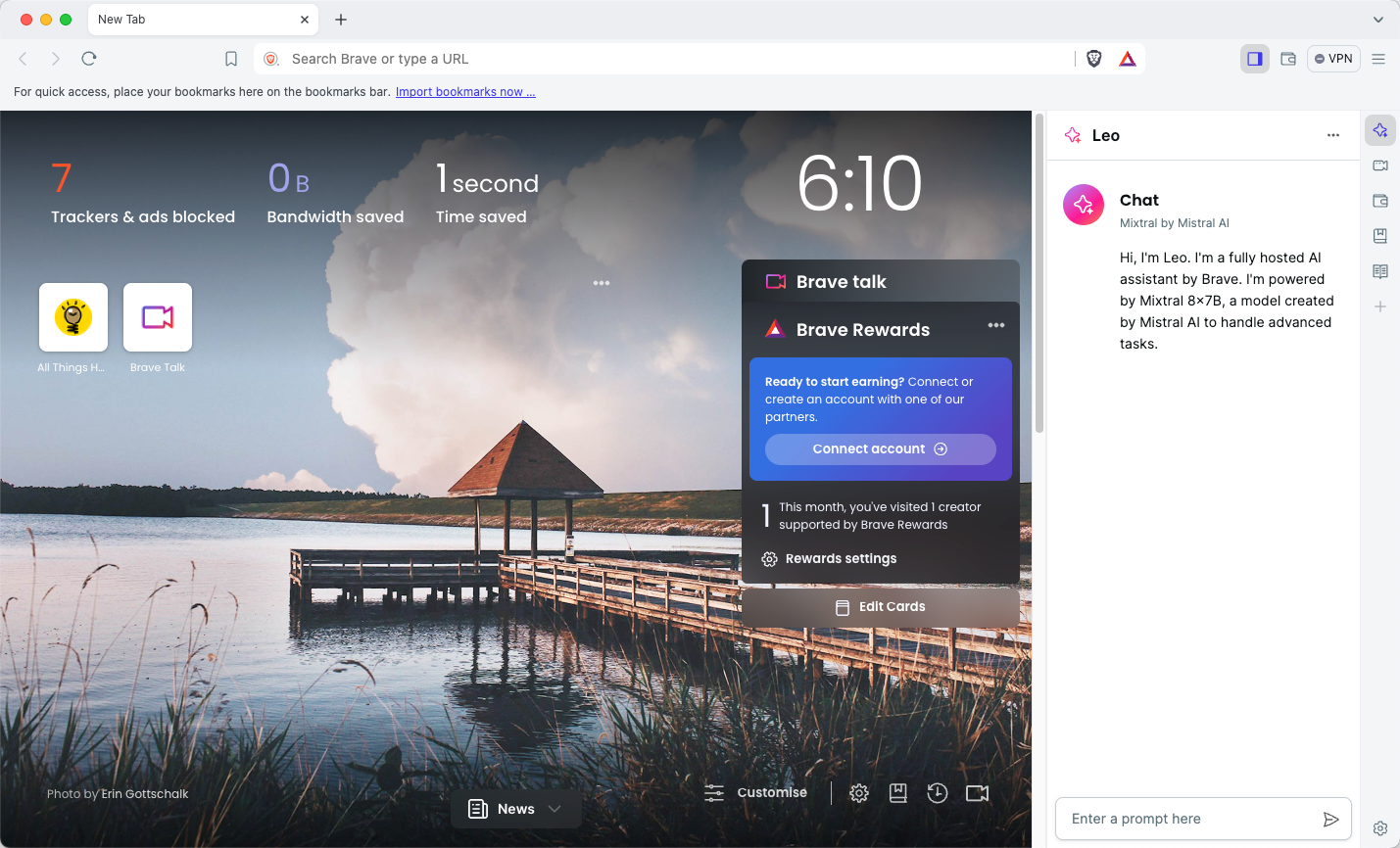
Leo in Brave
Pros: Runs on models self-hosted by Brave which focuses on user privacy; access to multiple AI models
Cons: Some features require a paid plan; With some models, the performance of AI leaves something to be desired
Platforms: Windows, Mac, Linux, iOS, and Android
Brave is one of the browsers privacy-centric folks reach out for the most. So, it comes as a shock to most when they learn that it has its own AI assistant. Leo in Brave browser can help you with getting information from web pages, documents, or PDFs; you can ask Leo for summaries, clarifications, and direct answers, among other things. It can also help you create content like emails, articles, blog posts, etc., or help with coding by providing suggestions or sample code.
Leo is accessible in the Brave Browser via the sidebar or the URL bar. Like other AI assistants, Leo, too, has contextual awareness and can access the contents of the page to answer your queries. You can also turn contextual awareness off with a simple toggle.
Now, the AI features in Brave are rather limited when compared to the other browsers on this list. So, what makes it good? It's focused on privacy – it's Brave, after all!
When you're chatting with Brave-hosted models, it does not retain your chats or any other information as soon as you end the current chat. This includes the default model that Leo uses for all interactions – Mixtral 8x7B from Mistral AI – as well as the Llama 2 13b model from Meta AI.
Other than the default model, Leo also offers other models like Claude Instant, Claude Haiku, and Claude Sonnet (available only to Premium users) from Anthropic. You can switch to any of these models but when you're using these models, the conversations are retained as per the company's policies (Anthropic retains user conversations for 30 days before deleting them.)
You can use Leo for free but interactions with the free version come with usage limits (except for the Llama 2 model). Brave also offers Leo premium for $14.99/month, which gives access to higher usage limits and Anthropic's Sonnet model.
Whether we like it or not, AI and AI-powered tools are here to stay. From AI search engines to image generators, machine learning models are enhancing a lot of tools on the Internet. Web browsers are one area where everyone should adapt these models in my opinion since they can considerably increase the speed with which you can get information from the web, which is the whole point of the browser. We've listed some of the best instances of AI web browsers in existence right now; the only thing left for you is to decide the one you want to go with.


